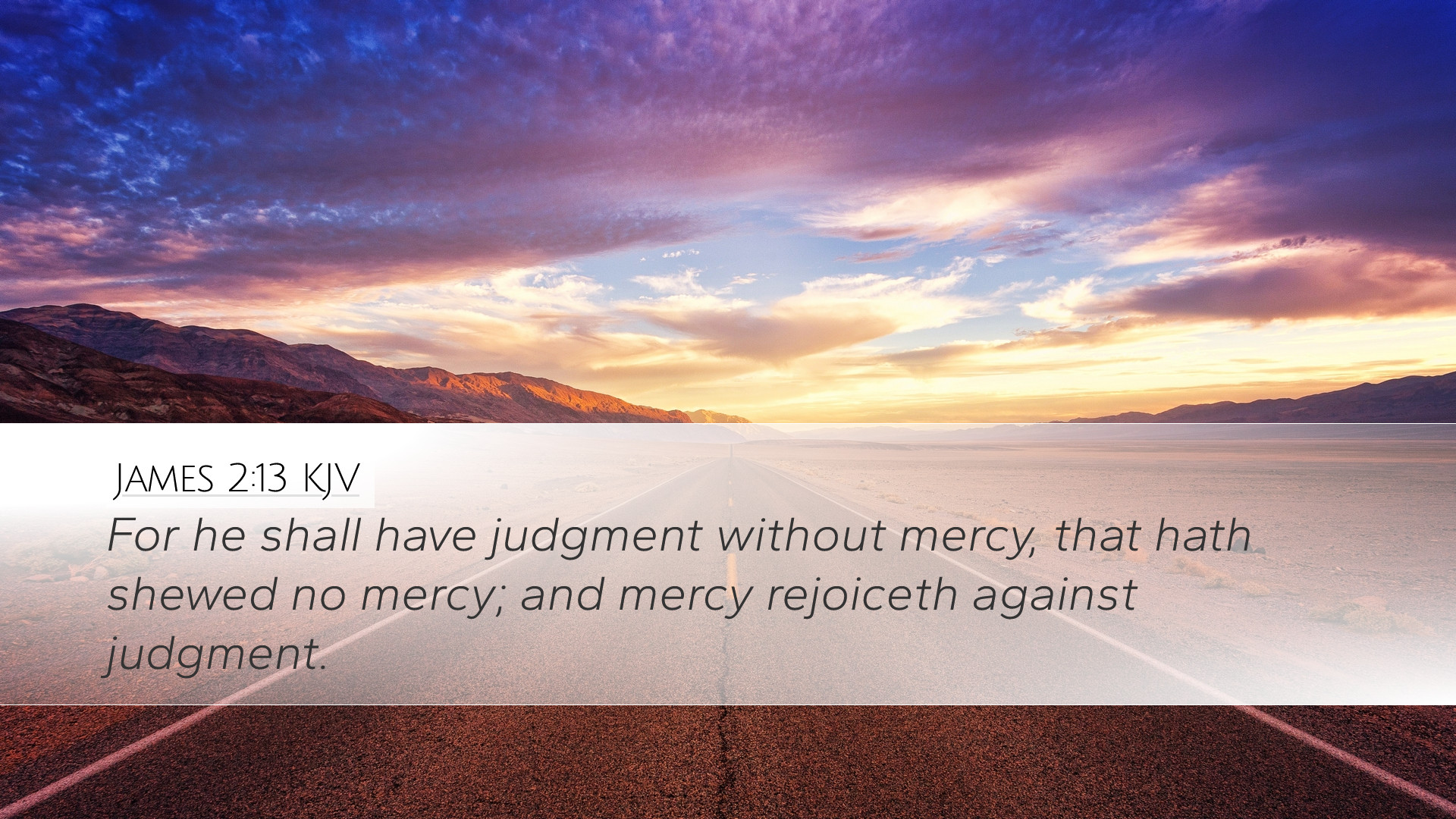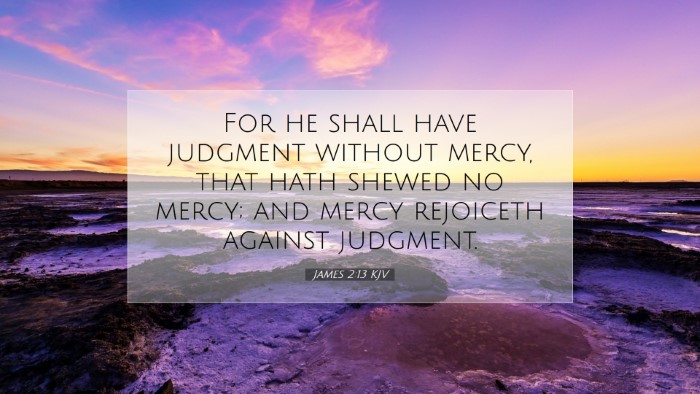Old Testament
Genesis Exodus Leviticus Numbers Deuteronomy Joshua Judges Ruth 1 Samuel 2 Samuel 1 Kings 2 Kings 1 Chronicles 2 Chronicles Ezra Nehemiah Esther Job Psalms Proverbs Ecclesiastes Song of Solomon Isaiah Jeremiah Lamentations Ezekiel Daniel Hosea Joel Amos Obadiah Jonah Micah Nahum Habakkuk Zephaniah Haggai Zechariah MalachiJames 2:13
James 2:13 KJV
For he shall have judgment without mercy, that hath shewed no mercy; and mercy rejoiceth against judgment.
James 2:13 Bible Commentary
Commentary on James 2:13
James 2:13 (ESV): "For judgment is without mercy to one who has shown no mercy. Mercy triumphs over judgment."
Introduction
The epistle of James is rich with practical wisdom and ethical instruction. In James 2:13, the apostle emphasizes the critical relationship between judgment and mercy. This verse serves as a sober reminder of the foundational Christian principle that mercy is central to our interactions with others, particularly in matters of judgment.
Contextual Analysis
Before diving into the commentary, it is essential to understand the context. James addresses issues of favoritism and social distinction within the Christian community. The subsequent instruction on faith and works further underlines the significance of demonstrating one's faith through actions, particularly those towards others.
Matthew Henry's Commentary
Matthew Henry notes that judgment without mercy indicates a severe reckoning that awaits those who neglect to show mercy towards others. Henry elaborates by underscoring that those who have experienced God's grace ought to be conduits of that mercy.
- Divine Justice: Henry accentuates the idea that God’s justice remains unwavering. Those who show no mercy align themselves with a strict interpretation of divine justice, which ironically leads to a lack of mercy being extended to them.
- Mercy as a Requirement: The essence of mercy being required of believers is expounded upon. True followers of Christ will imitate His grace, leading them to show mercy liberally to others.
- Influence of Actions: The behavior exhibited by individuals directly correlates with how they shall be judged. Henry cautions that a heart hardened by neglect of mercy cannot expect to receive mercy from the Lord.
Albert Barnes' Perspective
Albert Barnes expounds on the definitive weight of James' assertion regarding mercy and judgment. He highlights the crucial declaration that mercy triumphs over judgment, indicating that despite the inevitable divine judgment, mercy takes precedence for those who reach out to others in grace.
- Nature of God's Judgment: Barnes asserts that while God’s judgment is perfect and just, it is calibrated through the lens of mercy for those who respond to that mercy in their lives.
- Equality Among Believers: He stresses the integral call for equality and fairness in dealing with others, which dismisses favoritism and promotes an inclusive, merciful community.
- Encouragement to Reflect on Actions: Barnes encourages believers to review their interactions and treat others kindly, ensuring their actions reflect the mercy they seek from God.
Insights from Adam Clarke
Adam Clarke provides a robust theological interpretation of the text. He elaborates that the phrase "judgment is without mercy" suggests that those who completely disregard the need for mercy will ultimately face a stricter judgment.
- Spiritual Principles: Clarke indicates that a failure to show mercy equates to the rejection of divine principles that cradled the law, thereby illustrating God’s expectation for humanity.
- Practical Application: He emphasizes that believers ought to embody mercy in their daily lives, viewing it as an essential fruit of a genuine Christian faith that leads to a bounteous reward.
- Hope and Redemption: Clarke masterfully ties in the theme of hope, encouraging believers that as they extend mercy, they, too, will receive mercy, reinforcing the character implications of their faith.
Theological Reflections
The theological implications of James 2:13 encapsulate the essence of Christian living. The connection between mercy and judgment is powerful and encourages self-reflection among believers. Key points of consideration include:
- The Reflective Nature of Mercy: Christians are called to reflect the mercy they have received from God in their judgments towards others.
- Judgment as It Relates to Character: Impartiality in judgment serves as an essential element of Christian character; the community is called to exhibit a selfless love that mirrors the love shown by Christ.
- Hopeful Aspirations: Believers should aspire to embody mercy actively, as James promises that such mercy will ultimately resonate back to them in their walk with God.
Conclusion
James 2:13 serves as a clarion call to embody mercy as we navigate our relationships and interactions. In light of the commentaries of Matthew Henry, Albert Barnes, and Adam Clarke, it is evident that mercy is not merely an optional trait but a divine expectation that shapes our faith. Pastors, students, theologians, and scholars should not only preach and teach this truth but practice it diligently, fostering communities anchored in mercy, where judgment is tempered and love abounds.


